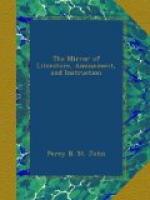PHILOMELOS.
* * * * *
NOTES
Abridged from the Magazine of Natural History.
Silkworm.—(By a Correspondent.)—It has occurred to me, and I have not seen it remarked elsewhere, as a striking and interesting peculiarity of this insect, that it does not wander about as all other caterpillars do, but that it is nearly stationary in the open box or tray where it is placed and fed: after consuming the immediate supply of mulberry leaves, it waits patiently for more being provided. I apprehend this cannot be said of any other insect whatever. This docile quality of the worm harmonizes beautifully with its vast importance to mankind, in furnishing a material which affords our most elegant and beautiful, if not most useful, of garments. The same remark applies to the insect in the fly or moth state, the female being quite incapable of flight, and the male, although of a much lighter make, and more active, can fly but very imperfectly; the latter circumstance ensures to us the eggs for the following season, and thus completes the adaptation of the insect, in its different stages, to the useful purpose it is destined to fulfil for our advantage.
The Possibility of introducing and naturalizing that beautiful Insect the Fire Fly.—It abounds not only in Canada, where the winters are so severe, but in the villages of the Vaudois in Piedmont. These are a poor people much attached to the English: and, at 10_s_. a dozen, would, no doubt, deliver in Paris, in boxes properly contrived, any number of these creatures, in every stage of their existence, and even in the egg, should that be desired: and if twenty dozen were turned out in different parts of England, there cannot remain a doubt but that, in a few years, they would be common through the country; and, in our summer evenings, be exquisitely beautiful.
Vigne, in his Six Months in America, says:—“At Baltimore I first saw the fire-fly. They begin to appear about sunset, after which they are sparkling in all directions. In some places ladies wear them in their hair, and the effect is said to be very brilliant. Mischievous boys will sometimes catch a bull-frog, and fasten them all over him. They show to great advantage; while the poor frog, who cannot understand the ‘new lights’ that are breaking upon him, affords amusement to his tormentors by hopping about in a state of desperation.”
The Vampire Bat.—Bishop Heber’s opinion of the innocence of this creature by no means agrees with what one has read of his bloodthirsty habits; and particularly the instances given by Captain Stedman, in his Travels of Surinam, who, more than once, individually, experienced the inconvenience of the Sangrado system of blood-letting, or, more properly, blood-taking, pursued by this practitioner.
“Non missura cutern, nisi plena cruoris hirudo.”




